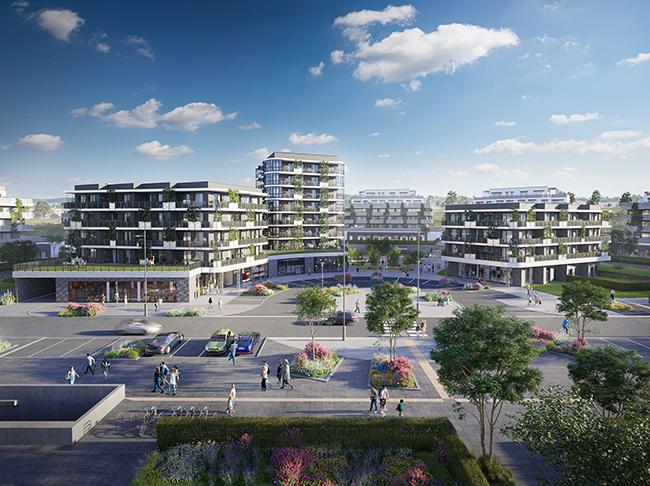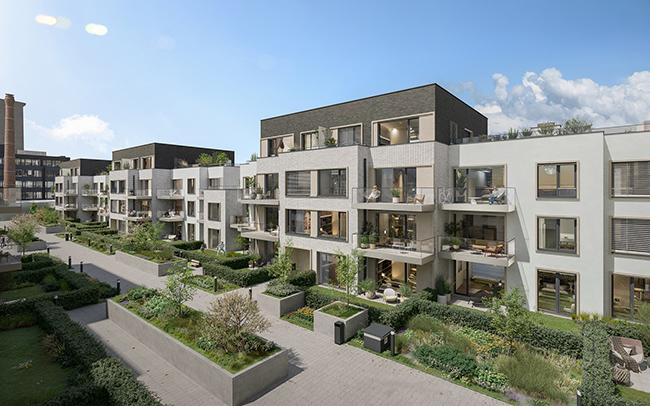UBM Development Czechia is implementing all of its current residential projects with BREEAM
UBM is one of the first developers in the Czech Republic to implement its residential projects with BREEAM certification. This is an ecological certification that confirms the standard of buildings in the field of sustainability and environmental friendliness. The BREEAM methodology assesses the sustainability of the construction and operation of buildings, including environmental features such as green roofs, rainwater management, energy efficient heating systems, etc. Emphasis is also placed on social and economic aspects. Certified buildings are, among other things, less energy intensive, have lower housing costs and bring other benefits to future occupants. With BREEAM certification, UBM is currently building the Arcus City residential complex in the Prague-Reporyje district and the Astrid Garden residential project in Holešovice, Prague 7.
The company is implementing the principles of its corporate green strategy. smart. and more, in which "green" means sustainability, "smart" means the construction of intelligent buildings and "more" means added value. UBM Development Czechia focuses on sustainability, environmental protection and the use of renewable resources, which is also confirmed by the platinum rating from EcoVadis and the "Prime Status" award from the rating agency ISS ESG. In view of the energy crisis and inflation, more and more people are demanding energy-efficient homes that will ensure lower operating costs in the future. A practical benchmark for these properties is the BREEAM certification, which of course also evaluates a number of other criteria," says Roman Ehrentraut, Managing Director of UBM Development Czechia. Certified buildings are more energy efficient than the standard required by Czech legislation. They have approximately 30% lower primary energy consumption. At the same time, water consumption is also significantly reduced by about 10-40% thanks to energy-saving equipment.
The globally recognised BREEAM ecological certification is not quite common in the Czech Republic in the field of residential construction, but interest in it is gradually growing. According to the official Green Book Live database, six completed projects in the Czech Republic have received the final certification so far. These include residential projects under construction by UBM Astrid Garden in Prague 7 and Arcus City in the Prague-Reporyje district.
BREEAM certification is divided into five levels: pass, good, very good, excellent and outstanding, which are classified by percentage according to the aggregate score in each category. UBM delivers its residential projects at a minimum of BREEAM Very good. "However, for the construction of the third phase of Arcus City, which is our pilot wooden building project in the Czech Republic, we are more ambitious and aim for BREEAM Excellent. Specifically, we will build the residential buildings in this phase as mixed timber buildings with the main load-bearing elements made of solid timber panels. All services related to the certification are provided by Grinity, which has many years of experience in certification, not only in the residential sector," says Tomáš Kurka, Cost Manager responsible for sustainability and environmental certification LEED and BREEAM at UBM Development Czechia.
Nine basic categories are assessed for new buildings: management, health and well-being, energy, transport, water, materials, waste, land use and ecology and pollution. A separate tenth category is innovation, which aims to motivate the identification and implementation of innovative technologies, features or processes beyond the requirements and BREEAM rating that contribute to the overall sustainability of the building. "In terms of the challenge of meeting the criteria, given the current availability in the market, materials represent a more difficult area. The waste category is also more complicated with regard to segregation, recycling or reuse. Some criteria in relation to land use and ecology or transport are fundamentally influenced by the location of the building itself. It is therefore always important to choose the site well. In our projects, we are able to meet these criteria well," explains Tomáš Kurka.
Roman Ehrentraut says of the specific elements that UBM is introducing in its projects, "We have focused on rainwater management with the use of ponds and retention measures and the use of rainwater for irrigation, among other things. We place emphasis on preserving green areas with meadow vegetation and high biodiversity through localised green species. We are implementing facilities for the possible reduction of drinking water consumption. We are also planning energy-saving facilities. We also promote electric mobility, ride-sharing and cycling. On some projects we are installing renewable energy sources such as deepwater boreholes or solar panels on rooftops. As a rule, future residents of new buildings by UBM can look forward to an overall better indoor environment in terms of acoustics or thermal comfort, excellent transport links and amenities in the vicinity."










